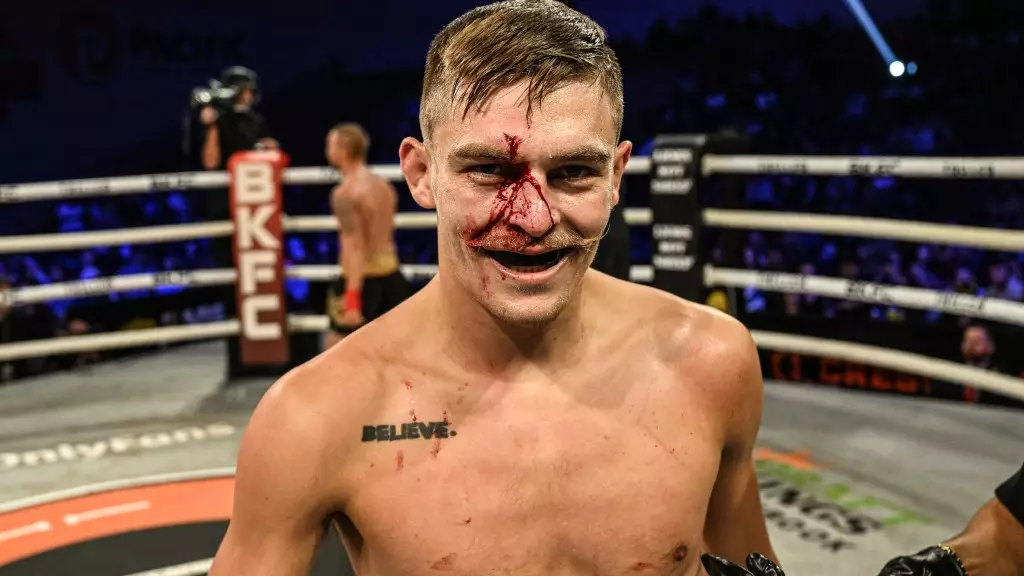In the world of combat sports, few are as electrifying and unpredictable as bareknuckle boxing. Among its rising stars is BKFC featherweight champion Kai Stewart, a 24-year-old fighter who is emblematic of the sport’s evolution. In an age where organized fighting often comes with an extensive arsenal of coaches and training methods, Stewart’s journey centers around innovation and individuality. He openly discusses the uncharted territory of bareknuckle boxing, emphasizing that he is essentially laying the foundational stones of a discipline still in its infancy. “There’s really no such thing as a bareknuckle boxing coach because it’s so new,” Stewart explains, highlighting the necessity for adaptability in a dynamic landscape.
Stewart’s journey to the top of the BKFC pyramid has not been traditional. Starting off in MMA, he decided to switch gears, drawn to bareknuckle fighting not just as a means of fame but as an avenue to redefine his career and secure a successful future. Surprisingly, the fighter admits to a hands-on training regimen largely developed alongside his girlfriend, a situation that is distinctly different from the structured environments seen in more traditional combat sports.
With a professional record of 7-0 and four title victories under his belt, Stewart is not just a competitor; he’s a product of grit and determination. Unlike many combat athletes who come from MMA backgrounds, Stewart immersed himself in bareknuckle boxing from the start, forgoing the typical path taken by fighters seeking broader recognition or experience in well-established organizations. His fight against former UFC contender Jimmie Rivera stands as a pivotal moment in his burgeoning career, confirming his place in the sport.
“I’m not just doing this for glory; I want to carve my own niche,” Stewart states, elucidating his understanding of the combat sport industry, which he perceives as indifferent towards many fighters. His initial motivation—making extra money and the aspiration to buy a puppy—may seem humble, but it belies a fierce hunger for success. “I never got the puppy, but I ended up getting four world titles so it worked itself out.” This determination and mindset crystalize Stewart’s philosophy that success is often born from embracing opportunistic paths, even if they lead one away from initial expectations.
Stewart is not merely content to dominate the BKFC. He envisions greater heights for himself and the sport, particularly a potential superfight with UFC star Sean O’Malley. “I want to fill a stadium for an all-Montana showdown,” he passionately expresses. While the realities of cross-promotional fights in the arena of combat sports can be limiting, Stewart’s ambition showcases his desire not just for personal achievement, but also for elevating the profile of bareknuckle boxing.
Their shared roots in Montana create a narrative thread between Stewart and O’Malley, a rivalry steeped in mutual recognition. Although there appears to be a playful banter rather than actual hostility—“I’ve never said a bad thing about O’Malley,” he stresses—the winds of competition are pushing them toward potential confrontation. This narrative not only stirs excitement among fans but also highlights Stewart’s belief in his potential as a formative figure in the sport’s history.
For Stewart, the drive to leave a legacy supersedes any financial motivations, a sentiment that resonates deeply in the world of sports, where integrity often takes a backseat to profit. In his pursuit of excellence, he reveals an intriguing twist to his objectives: “At this point, it’s legacy,” he asserts with greater fervor than before. The sheer joy of fighting and the camaraderie found within the sport take precedence over solely filling his pockets.
His aspirations aren’t merely about accumulating titles; they also embody a quest to redefine what is possible in bareknuckle boxing. “I’m three years into boxing, and I want to push boundaries and explore various avenues, regardless of where it may take me.” As Stewart reflects on his journey, it’s clear that he is committed to not just participating in, but also transforming, the landscape of combat sports.
In a time where bareknuckle boxing is often labeled as a fringe sport, champions like Kai Stewart stand at the forefront, shaping its future and potential prestige within the broader sporting context. The fighter’s unwavering dedication and value for both personal growth and sport quality ensure that he is more than a passing chapter in the narrative of combat sports; he is turning the page towards something undeniably captivating.

